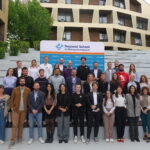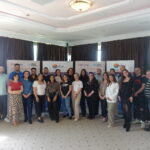More than twenty NGO leaders and legal experts from the Western Balkan countries have taken part in the workshop on justice and home affairs (Chapters 23 and 24) in the EU accession process. Two-day workshop is co-organized by Central European Policy Institute (CEPI) and Polish Institute of International Affairs (PISM). Among the speakers were representatives of Slovak government ministries, parliament, Special Court and watchdog NGOs active in monitoring of the judicial system and fight against corruptions. BFPE was represented by its Program Coordinator Marko Savkovic.
Having successfully joined the EU ten years ago, Visegrad Four countries feel it is their duty to share the experience and know-how with Western Balkan countries to advance their integration ambitions. The Bratislava workshop organised by the Central European Policy Institute (CEPI) and the Polish Institute of International Affairs (PISM) focuses on Slovak experience with cooperation between civil society and public administration during the EU accession process before 2004.
“As Western Balkan countries move on in the EU accession track, the role of civil society should rise as well. We believe that Balkan think tanks and NGOs can learn not only from the Slovak ”success story”, but from our mistakes as well. By bringing together representatives of public administration and civil society, this workshop enables us to share both,”
said project manager Andrej Chovan from CEPI.
The event was held within the framework of the project Visegrad for Strengthening Democracy in the Western Balkans: Slovakia’s Experience with Cooperation between Civil Society and Public Administration and brings together representatives of the non-governmental sectors in Albania, Bosnia and Herzegovina, Kosovo, Montenegro, Macedonia and Serbia, and their V4 counterparts in a series of meetings and workshops.
(With excerpts from CEPI Public Relations team, 20 March 2014)













